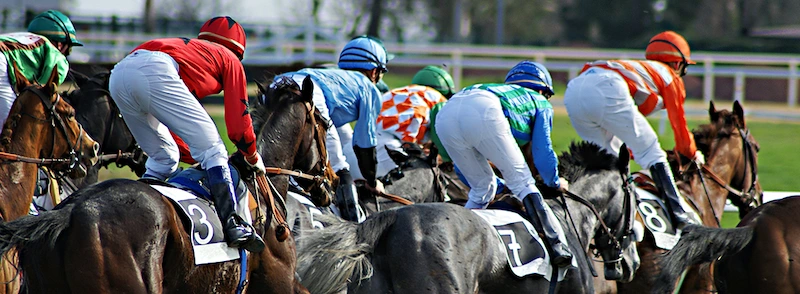Horse racing betting and the application of smart betting strategies are the key factors for players to achieve success in this field of sports betting. With a combination of understanding horse racing, careful analysis, and reasonable strategy, players can increase the winning rate, optimize profits, and minimize risks. SUPERPH will provide you with a comprehensive and in-depth view of horse racing betting.
Overview of Horse Racing Betting

Horse racing is a sport with a long history, attracting the attention of many fans. Along with the development of the entertainment industry, horse racing betting is popular, allowing players to experience thrilling and exciting moments.
To participate in horse racing betting, players need to master the rules of the game, types of bets factors affecting the results of the match. Understanding horse breeds, jockeys, trainers, weather conditions, track surfaces, and competition history will help players make wise decisions.
History of horse racing
Horse racing originated in ancient times, appearing in the civilizations of Greece, Rome, Babylon, and Egypt. In the Middle Ages, horse racing became popular in Europe and was favored by the nobility. By the end of the 18th century, horse racing had become a professionally organized sport with clear rules and regulations.
Popular types of bets in horse racing

Win bet: Players bet on the horse they believe will finish first.
Place bet: Players bet on the horse they predict will finish first or second.
Show bet: Players bet on the horse they think will finish first, second, or third.
Each-way bet: Combines Win and Place bets, increasing the chance of winning but with lower payouts.
Exacta bet: Correctly predict two horses to finish first and second in order.
Trifecta bet: Correctly predict three horses to finish first, second, and third in order.
Superfecta bet: Correctly predict four horses to finish first, second, third, and fourth in order.
Smart Betting Strategies in Horse Racing
Smart Betting Strategies in Horse Racing
Applying smart betting strategies is the key to success in horse racing betting. These strategies are drawn from the experience of professional players, based on data analysis, match analysis, capital management, and psychological control.

Data and information analysis
Before placing a bet, players need to collect and carefully analyze information related to the match, including:
Racing horse performance: Learn about the racing history, recent achievements, health, and adaptability of each horse. Information sources can be from horse racing websites, forums, and analytical articles.
Capacity of jockeys and trainers: Good jockeys and experienced trainers will contribute to improving the horse’s ability to win.
Weather conditions and track surface: These factors can affect the horse’s performance. For example, some horses may run better on grass tracks, while others are more suited to dirt tracks.
Odds: Analyze the odds offered by bookmakers to assess the winning chances of each horse and choose a valuable bet.
Odds analysis
The odds represent the probability of each horse winning according to the bookmaker’s assessment. There are many different types of odds, such as European odds (decimal), Hong Kong odds (fractional), and Malay odds (Indo).
Players need to compare the odds between different bookmakers, and combine them with their analysis to find valuable bets, that is, the odds are higher than the actual winning probability.
Capital management and risk control
Effective capital management is a factor for players to maintain stability and long-term development.
Divide the capital: Do not bet all your capital on a single match. According to the experience of many professional players, you should only bet a maximum of 5% of your total capital for each match.
Set a betting limit: Determine the maximum bet for each match and strictly adhere to it. This helps you control your risks and avoid losing everything.
Use capital management methods: Apply methods such as Kelly Criterion, Martingale, or Fibonacci to optimize profits and control risks. Each method has its advantages and disadvantages; you need to learn carefully before applying.
Control your psychology
Stay calm: Avoid letting emotions influence your decisions, especially after losses.
Betting with discipline: Follow your set strategy, do not get caught up in the crowd, or bet emotionally.
Know when to stop: Accept losses and withdraw when necessary. Do not try to recover when you are losing heavily.
